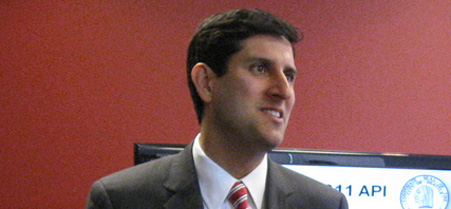Feds to cut greenhouse gases through the cloud
Vivek Kundra says shifting computer work from massive data centers to the Internet will conserve power and fuel.
 Vivek Kundra says the energy output from the government is expected to spike without the plan.
Vivek Kundra says the energy output from the government is expected to spike without the plan.
Government investments in cloud computing will contribute to the creation of a clean energy economy, the federal chief information officer said during Earth Week.
Agency CIOs are taking a cue from an October executive order that committed the government to lead by example in reducing greenhouse gas emissions, partly through energy-saving information technology. Federal CIO Vivek Kundra said on Wednesday that by consolidating data centers, working from home and sharing IT resources on an online-subscription basis -- or cloud computing -- agencies will become more environmentally responsible.
He likened the shift to Web-based computing to the emergence of the electrical grid and centralized water supply. "The old model went to duplicative and wasteful spending, when you had to have your own well and your own electrical generation capability. You had all this fragmentation that didn't lead to better resource utilization," Kundra said. "We want to shift to an environment where we can use computer power on demand."
If agencies don't start conserving computing power, the energy output from the federal government is expected to spike, he said. In 2006, computer servers exhausted more than 6 billion kilowatt hours of electricity, and that number is expected to double to 12 billion by 2011, unless the government adopts green IT practices.
In February, Kundra sent a memo to agency CIOs on data center consolidation that noted the number of federal data centers grew from 432 in 1998 to more than 1,100 in 2009. Agencies are using only about 6 percent of their infrastructure, he said on Wednesday, and certain agencies are seeing a sharp rise in server demand on a seasonal basis. The Internal Revenue Service, for example, strains its infrastructure around the April 15 tax filing deadline. His memo directed agencies to develop data center consolidation plans that identify opportunities for cloud computing by June 30. The plans will be incorporated into fiscal 2012 budgets by Aug. 30.
Cloud computing would reduce the nation's carbon footprint by conserving electrical power and fuel -- if workers can tap into the cloud from their home computers or remote workstations, Kundra said. The Office of Management and Budget is working with the Office of Personnel Management to encourage telework governmentwide. The Patent and Trademark Office, frequently referred to as the model for telework, reports that up to half its staff works remotely, Kundra said. "What that does from a green perspective and an Earth Day perspective is it saves vital resources."
The Environmental Protection Agency has been using meters to monitor and reduce power consumption at its major data centers. EPA's primary computing center in Research Triangle Park, N.C., for example, occupies about 24,000 square feet of a 100,000-square-foot building. "The agency is currently working to ensure that all of its other major data computing locations are submetered and measurable to ensure that we can track our energy consumption and efficiencies over time," EPA spokeswoman Tisha Petteway said.
The government's Energy Star labeling program, which helps consumers identify eco-friendly electronics, will offer certification criteria for data centers this summer, she said. And once the qualifications are available, EPA's North Carolina site intends to apply for certification.
On Earth Day, some contractors touted the environmental benefits of recent federal procurements. Data storage supplier 3PAR said 14 agencies, including OPM and the Energy, Justice and Commerce departments, deployed the company's storage servers this spring to reduce their carbon consumption. 3PAR's technologies allow agencies to store information with fewer disk drives, which cuts energy consumption and costs, company officials said.
In addition, when an agency buys from 3PAR, the company purchases carbon offsets on behalf of the agency -- credits that go toward clean energy or pollution-reduction projects such as wind farms and reforestation.
The company estimates its federal customers will accrue energy savings of more than $4.2 million during the next five years, comparable to cutting close to 55,000 barrels of oil.
NEXT STORY: High court to settle 'sexting' at work case






